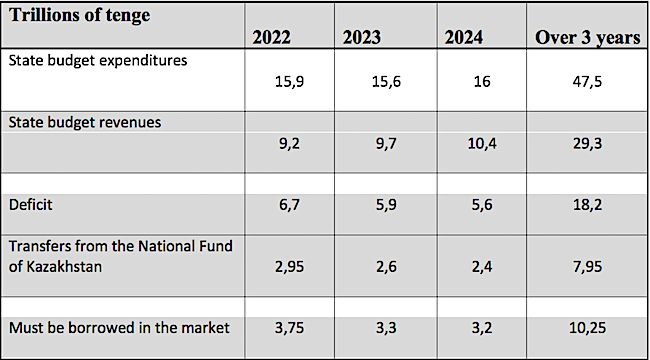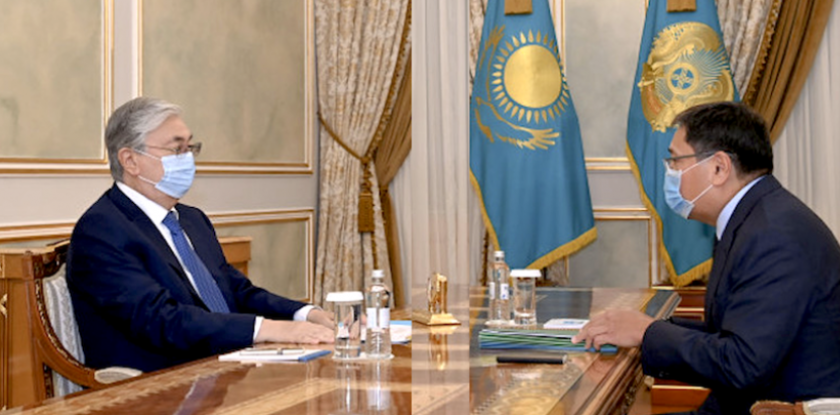On September 9, 2021, the RK Government presented the draft of the 2022-2024 budget to the Mazhilis of the Kazakh Parliament. Clearly, such complicated a document should be analysed in detail. However, at this point, we will go no further than making a brief commentary on the information that cannot but cause concern.
The press-release of this «historic» event can be found on the official website of the Lower House. As to the information that causes concern, here it is (text in bold by KZ.expert).
«Upon examining the macroeconomic data, the following forecast of the budget parameters has been developed. According to it, the 2022 budget revenue will constitute 9.2 trillion tenge, in 2023, it will constitute 9.7 trillion tenge, in 2024 — 10.4 trillion tenge.
Based on the data provided by the Vice Minister of National Economy, in 2022, the guaranteed transfer is to constitute 2.4 trillion tenge, in 2023 — 2.2 trillion tenge and, in 2024 — 2.0 trillion tenge. It is to be used for fulfilling the social obligations.
Apart from that, in 2022, the budget transfer from the National Fund of the Republic of Kazakhstan is supposed to constitute 550 bln tenge, in 2023-2024, 400 bln tenge a year.
At the same time, the 2022 budget deficit is predicted at the level of 3,3% against the GDP with further reduction to 2,5% against the 2024 GDP. The 2022 non-oil deficit is to constitute 8,1% against the GDP with further reduction to 6,3% against the GDP in 2024.
The volume of 2022 budget expenditures is to amount to 15.9 trillion tenge, in 2023, it is to constitute 15.6 trillion tenge and, in 2024 — 16.0 trillion tenge».
Formally, it is hard to find fault with the quoted paragraphs — all the information is presented correctly albeit craftily. Therefore, the general public is not going to hear about the fact that, again and again, Kazakhstan is going to borrow very large sums of money in the domestic and foreign market in order to cover the budget deficit.
Below, you will find a small table that allows to see the extent at which this will be happening.

It is not hard to see that, assessing the budget deficit in absolute terms instead of the percent/GDP ratio, we get a very different picture. And this, we at KZ.expert believe, cannot but raise concern. If only because it is the local taxpayers that will be repaying the debt and paying the interest whereas the state will assume a strictly intermediary role (albeit an omnipotent one).
In view of this, we would like to, yet again, touch upon the subject that Akorda and the Library seem to have closed once and for all, namely, the spending of the resources of the National Fund of the Republic of Kazakhstan.
The thing is that, curtesy of Nursultan Nazarbayev, the following regulation exists (citing «The Strategy of Forming and Using the Resources of the National Fund of the Republic of Kazakhstan»): «To perform the saving function, the National Fund must retain the irreducible balance in the amount of 30% of the forecasted GDP as of the end of the corresponding year».
In this case, the problem lies in the fact that such a wording makes no sense since the GDP can be both increased and reduced; therefore, the 30% safety threshold can also «jump» in terms of its absolute size.
Apart from that, we strongly doubt that the reserves of the National Fund that surpass a certain level should be kept intact — given the conditions of the market economy, it may be better to spent them wisely, for instance, to fund the national investment projects.
However, in Kazakhstan, this subject is basically closed. In our opinion, the reason for that lies in the fact that no one in the ruling elite wants to upset the First President much less come into conflict with him. For Nursultan Nazarbayev remains the head of the authoritarian political system and the «super-presidential» vertical even after giving away the presidential chair and authorities to his successor.
And even though we fully understand the reasons why Nursultan Nazarbayev has made this decision, the country has got more than enough people wishing to spend the resources of the National Fund. However, up until now, such spending has resulted in little good; from the economic standpoint, this kind of block represents stupidity of the global scale.
Yes, the Kazakh government is trying to solve this man-made problem in a roundabout way, however, it won’t be able to get round the Elbasy on a large scale. In view of this, we will allow ourselves to state that the irreducible 30% balance in the National Fund of the Republic of Kazakhstan serves mainly as a means of comforting Nursultan Nazarbayev and giving him confidence that he’s got an emergency reserve. In other words, the balance is maintained not in the national interests but to the private benefit of the Elbasy.




